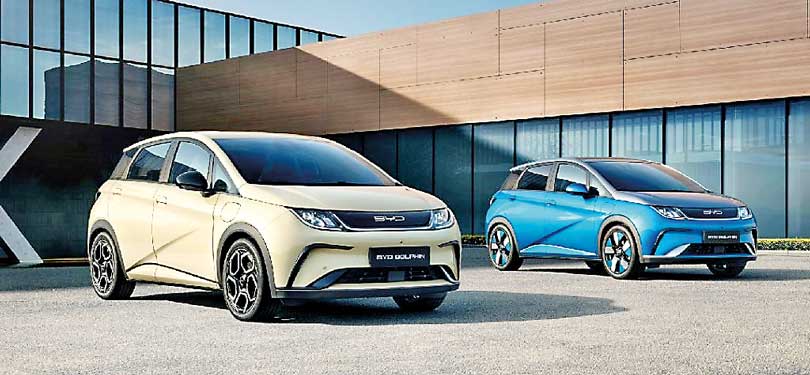Tuesday Feb 24, 2026
Tuesday Feb 24, 2026
Tuesday, 5 November 2024 00:01 - - {{hitsCtrl.values.hits}}

BYD said on 1 November it sold over 500,000 electric vehicles in October, setting a new record as the company reported quarterly revenue that exceeded Tesla’s for the first time, and made another leap towards becoming the country’s largest automaker.
Nearly a dozen Chinese automakers reported record-breaking sales figures over the month.
The sales figures reflected the increasing popularity of hybrid electric vehicles and the slowing growth of fully battery electric vehicles (BEV) in the world’s largest auto market, as anxiety around EVs running out of power remains a major concern for many buyers.
Nearly 60% of total BYD sales between January and October were plug-in hybrids (PHEVs), while a growing number of rivals, including Changan-owned Avatr and Geely’s luxury brand Zeekr, are hoping to drive PHEV sales by rolling out similar offerings.
Sales of passenger PHEVs, which include extended-range hybrids (EREVs), grew 78.5% in China for the first nine months of this year, compared with only a 17.6% growth rate for consumer BEVs, according to figures published by the China Passenger Car Association (CPCA).
Details: BYD set another record just a month after surpassing the 400,000 thresholds for monthly sales in September, reporting sales of 502,657 passenger EVs in October (in Chinese). The company’s year-to-date sales volume hit more than 3.2 million cars as of October, bringing it near its annual goal of 4 million car sales.
This means the EV giant is on track to officially become the number one automaker in China this year, ending SAIC’s nearly two-decade-stay at the top of the country’s rankings. Volkswagen and General Motors’ Chinese partner sold more than 2.6 million cars for the first nine months of this year, down 21.6% from a year ago.
Geely also announced a sales record of more than 100,000 green vehicles last month, partly driven by strong demand for its luxury Zeekr-branded BEVs (in Chinese). Volvo’s parent on 30 Oct. unveiled its Leishen EM-i hybrid EV system, providing its vehicles with a longer driving range of up to 2,390.5 kilometres (1,485 miles) and a lower fuel consumption of only 2.62 litres per 100 km compared with that of BYD’s similar technology.
New energy vehicle (NEV) sales of state-owned Changan and Chery, which mainly refer to PHEVs and BEVs in China, also surpassed the 80,000 and 70,000 unit thresholds for the first time in October, respectively. The number for Avatr, a niche, luxury brand controlled by Changan, more than doubled to over 10,000 units, thanks to the strong sales of its 07 crossovers with both BEV and EREV options launched in late September.
Both Huawei-backed EV brands, which fall under the umbrella of Huawei’s Harmony Intelligent Mobility Alliance, as well as Leapmotor, which counts Stellantis its largest shareholder, achieved solid growth last month with an expanding lineup of BEVs and EREVs. The October deliveries for Li Auto, a major player in the country’s EREV market, slightly declined by 4% month-on-month but still hit over 50,000 units.
Xiaomi sold over 20,000 EVs per month for the first time in October, with only one model on offer, and last week began pre-sales of the SU7 Ultra, a luxury version of its first EV model the SU7. Both NIO and Xpeng Motors delivered more than 20,000 vehicles last month. NIO is reportedly planning to introduce its first hybrid model in 2026. The timeline for Xpeng to do the same is 2025, local media reported. (Source: https://technode.com/2024/11/04/byds-monthly-sales-surpass-500000-for-the-first-time-as-it-looks-set-to-become-chinas-biggest-automaker/)